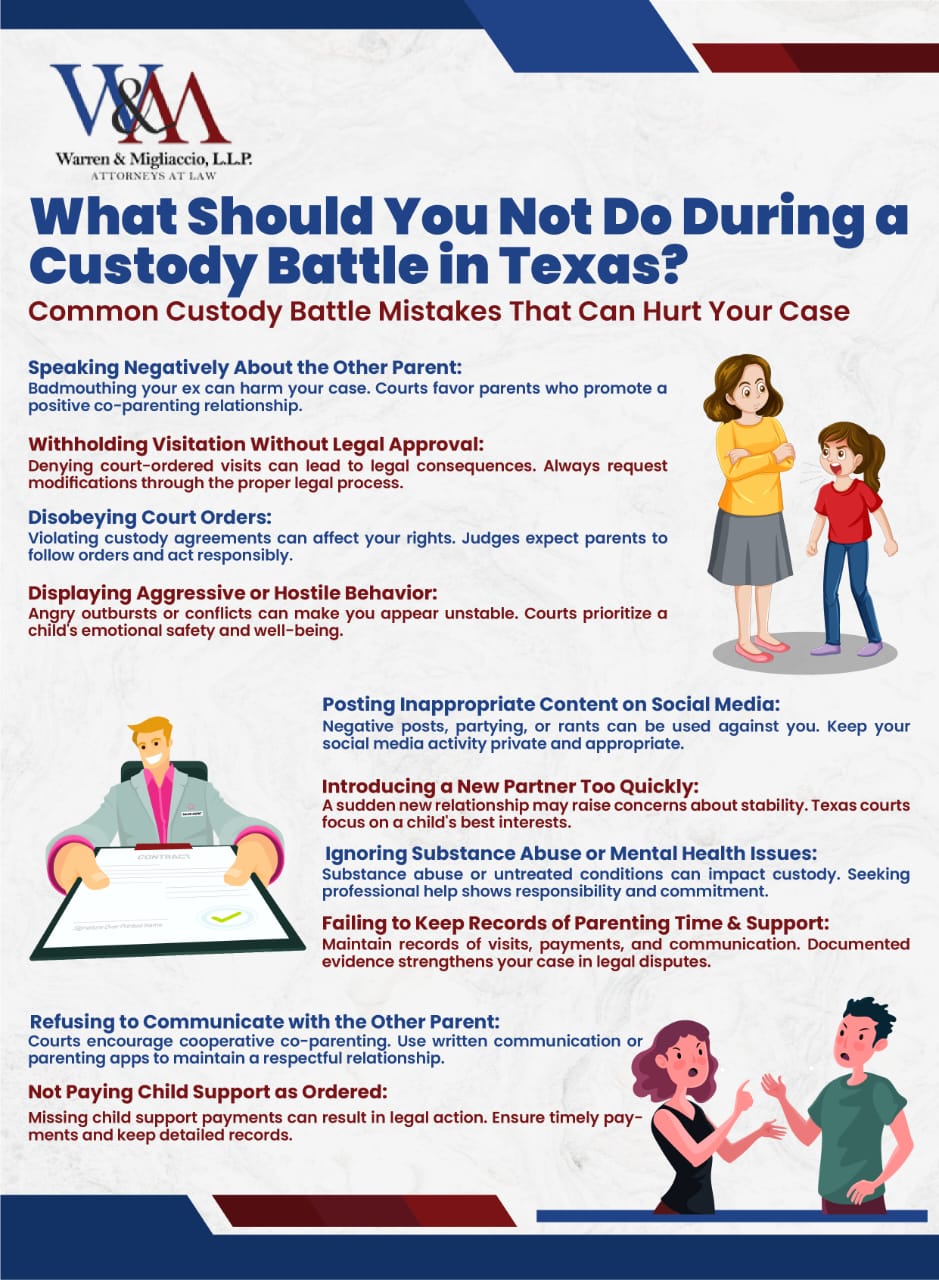In child custody battles, your actions can have a big impact. Certain behaviors may damage your case—and can even backfire—if you are not careful. Understanding what should you not do during a custody battle is essential to protect your child’s well-being and your parental rights. This article highlights crucial common mistakes to avoid. Knowing what should you not do during a custody battle can strengthen your position in court.
Key Takeaways
- Avoid negative comments about the other parent to protect the child’s emotional well-being and strengthen your custody case.
- Adhere to court orders and communicate openly with the other parent to show you value co-parenting and the child’s best interests.
- Document all interactions and incidents carefully to give evidence of your involvement and dedication during the custody proceedings.
Understanding the Child’s Best Interest Standard
Definition and Importance in Custody Cases
In child custody cases, the child’s best interest standard is the main focus. This means the court looks at what is best for the child’s physical, emotional, and mental health. The goal is to create a stable and nurturing environment for the child.
The child’s best interest standard is important because it helps the court decide what affects the child’s life. The court considers:
The child’s relationship with each parent.
The child’s age and needs.
Each parent’s ability to provide a safe and loving home.
The parents’ willingness to co-parent and communicate well.
The child’s wishes if they are old enough to say what they want.
By using this standard, the court makes decisions that help the child grow up healthy and happy. It encourages parents to focus on their child’s needs. Parents should work together to make a co-parenting plan that benefits their child. The child’s best interest standard ensures custody arrangements support the child’s well-being and
Common Mistakes and Possible Consequences
| Mistake | Potential Consequence |
|---|---|
| Negative comments about the other parent | Court may see you as unwilling to co-parent, damaging your custody case |
| Withholding visitation without approval | Legal penalties or changes to custody arrangements |
| Ignoring substance abuse issues | Reduced credibility and concerns about child safety |
| Not paying child support on time | Court sanctions, fines, or jail time |
| Violating court orders | Loss of custody rights, contempt of court |
Avoid Speaking Negatively About the Other Parent
During a custody battle, emotions can take over. It’s easy to make negative remarks about the other parent, but these comments can have serious consequences. Children absorb conflict, and criticism can affect their mental health.
Speaking badly about the other parent can also hurt your custody case. Courts disapprove of parental alienation—trying to turn a child against the other parent. It suggests you are not focused on the child’s best interests.

Constant arguments can harm a child’s well-being and development. A positive co-parenting relationship helps the child and often leads to better custody results. Instead of criticizing, focus on productive communication.
A stable and caring environment is best for the child. Negative talk can weaken your case and disrupt their sense of security. A respectful, positive attitude shows your dedication and ability to co-parent.
How Does Negative Speech About the Other Parent Affect Children? (Anecdote)
After the third paragraph above, imagine a parent who is overwhelmed by frustration and vents on social media about the ex-spouse. The child, looking for extracurricular updates, goes through the parent’s feed and sees those harsh words. The child feels guilty about spending time with the other parent and thinks they must pick sides. Soon, the child’s grades suffer, and they withdraw from friends. Even though the negative remarks were brief, the damage to the child’s emotional health lasts.
This example shows how even a quick outburst can backfire. It can weaken co-parenting efforts and create a negative view of you in family court.
Do Not Withhold Visitation Without Court Approval
Withholding visitation without a court order can cause serious legal issues. In Texas, if you stop visitation without a valid reason, you might face legal action or changes in custody arrangements. Courts see this behavior as harmful to the child’s well-being and the co-parenting relationship.
Here’s what you need to know:
You cannot block the other parent’s visitation rights without a court order unless the child is in immediate danger.
Texas judges believe children benefit from having both parents involved in their lives.
If you have safety concerns, seek legal approval to change visitation.
The custody process aims to keep both parents connected with their children. Holding back visitation without proper notice or legal backing can lead to fines or changes in custody status. It might also make you look uncooperative. If you think the child is at risk, talk to a family law attorney or child custody lawyer. This shows respect for the legal process and protects the child’s well-being.
Related Guide: Interference With Child Custody Texas: What Parents Need to Know
Maintain Effective Communication with the Other Parent
Clear and respectful communication with the other parent is very important during a custody battle. Good dialogue can speed up custody issue resolution and tells the court you are willing to co-parent, which is favorable.
Poor communication often leads to misunderstandings that complicate custody arrangements. It is helpful to use written methods like emails or text messages to keep a clear record of your talks about the child’s needs. This proof can be vital in court, showing you are engaged in co-parenting.
A good parenting plan or custody agreement can lower the need for court battles and give the child stability. Mediation can also improve communication and solve custody arguments. A positive relationship with the co-parent keeps the focus on the child’s well-being and prevents unnecessary drama.
Overall, having a supportive, calm environment helps the child thrive. Communicating well ensures both parents address the child’s needs and schedules effectively. This benefits the child and can help your custody case.

Control Your Emotions During Legal Proceedings
Keeping calm during a custody battle and at a custody hearing is essential. Emotional outbursts can make the court question your mental health and overall suitability as a parent. Texas courts value a parent who can offer a stable home environment.
Instead of reacting emotionally, stay clear-headed and logical. This prevents you from taking negative actions. Setting boundaries with your ex-spouse can reduce conflicts during legal proceedings, showing you are responsible and steady.
If needed, seek help from a mental health professional. Understanding the emotional effects of custody conflict on children can also remind you to control your behavior. Doing so helps both your mental health and your case.
Ultimately, you want to show you can create a stable and caring home for the child. Emotional stability is key in custody decisions, and remaining composed can strongly impact your custody outcome.
Related: What Not to Say During a Custody Battle in Texas
Do Not Involve Children in Custody Disputes
Putting children in the middle of custody disputes can harm their emotional and mental health. Negative comments about the other parent can lead to parental alienation. This pushes children to pick sides, which can damage their bond with both parents and cause long-term harm.
Children who feel caught in custody fights might think they need to choose a “winner.” This can cause them stress and confusion. Focus on the child’s emotional health, and do not drag them into adult issues.
Here are some important points to remember:
Avoid asking a child to say which parent they “prefer.” This can affect them negatively.
Custody orders usually forbid talking badly about the other parent in front of the children.
Don’t make the child a go-between for adult concerns.
Keeping the child out of your custody battle shows you care about their well-being.
Avoid Misuse of Social Media
Social media can either help or hurt you during a custody battle. Anything you post might become evidence, and the court may view questionable posts as a sign of irresponsibility.
Harsh remarks about the other parent on social media can sabotage your custody case. Also avoid posting private details that someone could twist or use against you. Making sure your privacy settings are strict can help control who sees your posts and protect the child.
Ultimately, you want to show you are a mature, responsible parent. Using social media wisely helps your credibility and supports your custody position.

Be Honest About Substance Abuse Issues
Honesty about substance abuse issues is very important during a custody battle. Judges focus on how substance use affects parenting rather than the use itself. If you lie or try to hide a problem, it can severely damage your credibility.
Taking real steps toward recovery can help your case by showing the court you want to improve your situation and offer a stable environment for the child. Failing to complete a treatment plan can make the judge question your willingness to follow court orders or keep the child safe.
Your main goal is to show that you can provide a secure, nurturing place for the child. Being truthful about substance abuse issues and showing progress toward recovery can greatly boost how the court views your fitness as a parent.
Do Not Ignore Court Orders
Always follow court orders during a custody battle. These orders exist to ensure the well-being of children in child custody cases. Breaking them can lead to being in contempt which may result in penalties like fines or mandatory parenting classes.
Not following court orders can be extremely serious, and is one way to lose custody rights. Judges will see it as irresponsible and lacking commitment to co-parenting. If your situation changes and the order no longer works, seek a legal modification rather than ignoring the directive.
Your aim is to respect the legal process and protect your child’s best interests. Obeying court orders strengthens your case and shows you are a responsible parent.
Related Guide: What to Do When Your Ex Stops Paying Child Support in Texas
Refrain from Introducing New Partners Prematurely
Bringing new partners into your children’s lives too early can signal poor judgment. Courts usually dislike kids meeting new romantic partners in the midst of a divorce because it might negatively affect custody outcomes.
Children can also feel upset having to meet someone new while still dealing with the divorce. They might not want to visit if they feel uncomfortable. Give your child time to adjust to existing changes before introducing a new partner.
Your focus is to give the child a stable, caring setting. Holding off on introducing new partners right away shows you prioritize the child’s well-being.
Legal Comparison: Do’s vs. Don’ts in Custody Cases
| ✅ Do’s | 🚫 Don’ts |
|---|---|
| ⚖️ Maintain respectful communication and document all interactions. | 🔇 Engage in negative remarks without keeping any records. |
| 📜 Follow court orders and seek modifications through proper legal channels. | ❌ Ignore court orders or withhold visitation without approval. |
| 🗂️ Keep detailed records and evidence to support your case. | 🚫 Rely solely on verbal agreements or memory. |
| 💵 Pay child support on time to demonstrate financial responsibility. | ⏰ Miss payments or withhold child support. |
| 👥 Hire experienced legal counsel to guide you through custody matters. | ⚠️ Attempt to handle custody disputes without proper legal advice. |

Document All Interactions and Incidents
Detailed documentation is key to showing your involvement in a custody battle, and it can be very useful in court. Keeping organized records of all interactions and events can make your case stronger.
Track the dates and times of all communication with the other parent. If the other parent later denies you contacted your children, your records may prove otherwise. Tools like parenting time calendars also help you track visitations and keep communication clear.
Keep notes on the child’s well-being, such as emotional ups and downs or any changes in health. This shows your attentiveness. Good documentation highlights your dedication to your child.
Suggested Documentation Tools
| Tool | Purpose |
|---|---|
| Parenting Time Calendar | Tracks each parent’s visitation dates and times |
| Email Records | Provides a clear, time-stamped record of discussions |
| Phone Call Log | Documents call dates, topics, and any specific concerns |
| Expense Sheets | Shows you have paid or contributed to the child’s expenses |
| Journaling App/Notebook | Captures daily observations of the child’s emotional or physical well-being |
Avoid Aggressive Behavior
Aggressive behavior can destroy your chances of a favorable custody decision. Courts prioritize a safe environment for the child, so displays of aggression—physical or verbal—can make a judge question your fitness as a parent.
Even a single hostile outburst can lead to serious consequences, including possible jail time if things escalate. Judges watch for signs of instability or threatening behavior that could put the child at risk.
By staying calm and level-headed, you show you can offer a safe home for your child. This bolsters your case and protects your child’s best interests.
Pay Child Support Promptly
Paying child support on time demonstrates respect for the court and shows you care about your child’s needs. If you fail to pay, it may suggest you are not concerned about your child’s well-being. This can hurt your custody case and even lead to temporary orders against you.
Failure to pay child support can bring fines or jail for contempt of court. In some places, you could face wage garnishment or a suspended driver’s license. Always pay court-ordered support on time to avoid these risks.
If you pay child support directly to your ex-spouse, keep a record of all transactions. This evidence protects you if someone falsely claims you did not pay.
Your goal is to show you respect the legal process and care about your child’s welfare. Paying child support on time supports your case and shows responsibility.
Respect Privacy and Confidentiality
Keeping things confidential in custody cases stops sensitive information from being turned against you. It also allows people to speak freely without fear of negative consequences.
Use secure communication methods, so the wrong person does not get details that could harm your case. Posting inappropriate things about the other parent online may look bad in court, and revealing sensitive information can weaken your custody claim.
Making sure your social media settings are private can also protect your child’s well-being by limiting who can see updates about them. Showing respect for everyone’s privacy helps keep the custody battle more civil.
Preparation and Representation Mistakes
Importance of Legal Preparation and Seeking Representation
In a child custody case, proper preparation and strong legal help are key to a good outcome. But many parents make mistakes that hurt their case and affect their child’s well-being. One major mistake is not hiring a lawyer or failing to prepare for court.
An experienced family law attorney is essential. They can guide you, help you understand the legal process, and protect your rights. A lawyer also explains the “child’s best interest” standard and how it applies to your case.

Common preparation and representation mistakes include:
Failing to seek legal representation or hiring an inexperienced attorney
Not preparing adequately for court proceedings, such as failing to gather evidence or secure witnesses
Not understanding the child’s best interest standard and its relevance to the case
Poor communication with the other parent or their attorney
Being unprepared to address potential issues or concerns raised by the court
To avoid these pitfalls, it is essential to:
Hire an experienced family law attorney who understands child custody laws and procedures
Gather and organize evidence and witnesses to support your case
Understand the child’s best interest standard and how it applies to your situation
Communicate effectively with the other parent or their attorney
Be prepared to address any potential issues or concerns raised by the court
By seeking legal representation and preparing thoroughly, you can increase your chances of achieving a favorable outcome in your child custody case, ultimately supporting your child’s well-being.
Mediation and Negotiation Mistakes
How Was Domestic Violence Handled in a Hypothetical Family Court Case? (Case Study)
In a family court case, a parent claimed domestic violence to seek sole custody of a minor child. The court ordered custody evaluations to check the child’s safety. During the process, the judge found no proof of the claim. Still, the court added safety measures, like structured drop-offs, to reduce conflict during visits.
The judge referred to Texas Family Code Section 153.004. This law requires courts to review any history of domestic violence when deciding custody. In the end, the judge allowed joint custody but required both parents to attend counseling. This decision aimed to protect the child while ensuring they kept a bond with both parents.
Source: Texas Family Code
How Did Temporary Orders Influence Spousal Support and Custody? (Case Study)
During a hard-fought divorce process, a Texas judge issued temporary orders that set spousal support and child visitation schedules. The non-custodial parent had to pay a monthly amount to cover essential household costs until final orders were in place. This gave the child stable living conditions and paid for necessities such as extracurricular activities.
The judge cited Texas Family Code Section 6.502, which lets courts issue temporary orders to protect those involved in a marriage dissolution suit. When the case ended, the court checked each parent’s income, relationship with the child, and willingness to cooperate. Because the non-custodial parent followed the temporary orders, the judge saw them as responsible and granted a balanced custody agreement that preserved legal custody rights and physical custody time. The goal was to act in the child’s best interests.
Source: Texas Family Code Section 6.502
Key Data on Child Custody in Texas
Below are some verifiable statistics related to child custody and divorce process outcomes in Texas. These figures show why staying informed and following best practices is critical:
According to the Texas Office of Court Administration (txcourts.gov), over 40% of family law cases filed each year in the state involve child custody or visitation schedules disputes. This reveals how often custody challenges arise and why courts emphasize cooperative parenting.
A U.S. Census Bureau study (census.gov) found that nationwide, about 80% of custodial parents receive some type of child support. However, many still have problems receiving consistent payments, which affects both physical custody and the child’s financial stability.
Understanding the factors that influence child custody determination can help parents navigate the legal process more effectively.
These statistics emphasize the high number of child custody cases and the big role that financial support plays in meeting a child’s needs. Staying aware of these issues helps parents understand the importance of following legal guidelines, keeping good communication, and fulfilling child support obligations.

Frequently Asked Questions
Co-Parenting & Communication
How can effective communication with the other parent impact custody outcomes?
Effective communication with the other parent can greatly improve custody outcomes by helping resolve issues and showing courts you can co-parent. This teamwork can lead to more positive decisions for both parties.
Why is it important to avoid speaking negatively about the other parent during a custody battle?
It’s crucial to avoid speaking negatively about the other parent because it can harm the child’s emotional well-being and damage your custody arrangements. Courts may see this as a sign of poor co-parenting, which can affect your parental rights.
Parental Alienation & Child Involvement
What is considered parental alienation in Texas?
Parental alienation involves one parent purposely harming the child’s bond with the other parent, often through negative comments or blocking contact. In Texas, any action intended to weaken the parent-child relationship is taken seriously and can hurt your custody case.1. Courts may require therapy or parenting classes if there’s proof of alienation.2. Repeated negative remarks or refusal of visitation may serve as evidence.3. Being cooperative overall supports a stronger custody case.
Should you involve children in custody disputes or court proceedings?
No. Involving children can cause them stress and hurt their emotional well-being. Texas courts discourage parents from making kids choose sides or discussing adult issues in front of them.1. This behavior can be viewed as parental alienation or manipulation.2. Keeping children away from legal conflict shows maturity and responsible parenting.3. In some instances, a court may privately consider an older child’s preference, but forcing them to pick is strongly discouraged.
Introducing a New Partner
What are the risks of introducing new partners prematurely during custody proceedings?
Doing so may make you look unstable to the court, which could harm your custody case. Courts generally disapprove of bringing children around new romantic partners when the divorce or custody process is still in progress.
When is it advisable to introduce a new partner during a custody battle?
It’s best to wait until the custody process has settled. A fast introduction can be seen as unsettling for the child and might affect custody decisions.1. Give the child time to adjust to the divorce first.2. Slow, low-pressure introductions minimize stress.3. Demonstrating a stable environment helps show you prioritize the child’s needs.
Court Orders & Visitation
How can withholding visitation affect a custody case in Texas?
Unjustified withholding of visitation can lead to fines or adjustments in custody. Texas courts believe that both parents are vital to a child’s best interests.1. Violating court orders may cost you custody time.2. If there are real safety issues, pursue an official change to the order.3. Cooperating with visitation often leads to better custody outcomes.
What steps can I take if my ex violates visitation orders in Texas?
If your ex breaks a visitation order often, note each instance and consult an attorney. The court can hand down fines or enforce the existing order.1. Keep thorough records of missed dates and communications.2. Try resolving minor problems with mediation first.3. Showing you act quickly to protect parenting time helps your case.
What are the legal consequences of ignoring court orders in a Texas custody dispute?
Not following court orders can lead to fines, forced parenting classes, or limited custody rights. Texas judges view non-compliance as irresponsible.1. Contempt of court may include jail time if violations are severe.2. Non-compliance damages your credibility with the judge.3. Get a legal modification if your situation changes instead of ignoring orders.
Substance Abuse
Why is it important to be honest about substance abuse issues during a custody battle?
Courts focus on how substance use affects your parenting. Being truthful about substance abuse builds trust with the court and can show you’re committed to recovery.
How does substance abuse impact custody decisions in Texas?
Substance abuse can affect custody by raising doubts about a parent’s ability to provide a safe, stable home. Courts expect honesty and recovery efforts.1. Completing rehab can show genuine effort to improve.2. Hiding or lying about substance use hurts your credibility.3. Judges put the child’s safety first.
Evidence & Documentation
Can social media posts be used as evidence in a custody battle?
Yes. Any posts, pictures, or messages can be part of Texas custody hearings. Courts look at whether such posts suggest poor judgment or hostility.1. Inflammatory content may show instability.2. Private messages can be subpoenaed.3. Use strict privacy settings and caution in posting.
What documentation is most effective for proving parental involvement?
Detailed records of communication, visitation, expenses, and more can show a consistent pattern of parenting. Organized logs prove you are reliable.1. Keep receipts for children’s expenses.2. Note medical or school visits in a journal.3. Good documentation shows the court your daily role in the child’s life.
Courtroom Conduct
Why is maintaining composure in court essential for a custody battle?
Staying calm shows responsibility and emotional stability, which judges value in custody decisions. 1. Losing control or yelling in court can damage your credibility.2. A professional demeanor makes your statements clearer.3. Counseling may help you handle stress.4. Courts focus on the child’s interests, so staying balanced helps your case.
Common Pitfalls & Mistakes
What looks bad in a custody battle?
Any sign of hostility, lack of reliability, or ignoring your child’s needs can hurt your case. Constantly attacking the other parent, not following orders, or showing up late shows you are uncooperative. Courts generally favor parents who stay calm and child-focused.
What not to say in a custody battle?
Avoid remarks that question your ability to co-parent or pit the child against the other parent. Baseless accusations or insults may temporarily feel good but will damage your credibility in court. Stick to facts about the child’s well-being.
What can be used against me in a custody battle?
Everything from nasty texts and social media posts to ignoring court orders could be used against you. Judges look for patterns of negative or irresponsible behavior. Keep your interactions civil, documented, and professional to avoid giving the other side any ammunition.
What is the biggest mistake in a custody battle?
Acting out of anger instead of focusing on the child’s best interests is one of the most common, damaging mistakes. Letting hostility take over can hurt you in court and make you look unfit. Stay calm and solutions-focused to show you prioritize your child over personal conflicts. Learn more here.
Conclusion on What Should You Not Do During Custody Battle In Texas
To sum up, going through custody battles in Texas requires you to be mindful of your actions. Avoiding the major mistakes laid out in this guide can improve your odds of a good custody result. From open communication with the other parent to documenting every interaction, each step shows the court you are a responsible, capable parent.
Above all, keep the child’s best interest at the forefront of your choices. By not speaking negatively about the other parent, staying calm in court, and respecting privacy, you show your concern for the child’s well-being. Following court orders, making child support payments on time, and practicing respectful co-parenting can also influence how your case is viewed.
Prioritizing your child’s best interests is essential. By staying respectful, following court orders, and practicing cooperative co-parenting, you can positively influence your case. If you have questions about legal custody, sole custody, or child support, seeking professional legal guidance is crucial. Our experienced Texas child custody attorneys can provide the support and clarity you need. During a consultation, we can discuss your situation, answer your legal questions, and explore how we can help you. Call us at (888) 584-9614 or contact us online to take the next step in protecting your parental rights.
Disclaimer: The information in this article is for informational purposes only and does not constitute legal advice. If you need personalized guidance for your child custody dispute or other family law cases, consult a qualified attorney or law firm.

